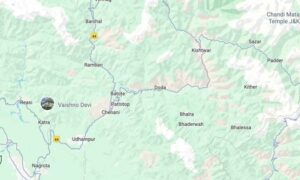
Kunjana Parashar’s debut poetry collection, They Gather Around Me, the Animals, is the winner of the 2024 Barbara Stevens Poetry Book Award. It is a quietly disarming work that slips past the reader’s defences, through a deep, sustained attention to the overlooked and the ordinary. In a moment in the poetry world where ecopoetry often leans toward urgency or activism, Parashar’s poems resist the impulse to instruct or alert us. Instead, the poems display radical humility, constructed on a base of keen observation, dwelling, and resistance.
The book invites the reader with poems like “Dedication”, “Prayer”, and “Wait”, which slowly set the tone of Parashar’s poetics. Instead of imperative instructions, she tells us about her dedication to the ordinariness of nature’s beings, walking us through the observant nature lover’s tasks that are simply waiting, listening and digging “into the dark sleep of moss.”
What makes this collection stand out is its commitment to the unspectacular. The animals of the title are not the majestic creatures of nature documentaries. They are indeed sewer gnats, frogs, cabbage moths, millipedes, and lizards. These creatures are not used as metaphors for human emotion or political commentary. They are not like anything else. They are simply themselves, and are present, alive, deserving attention throughout the poems on their own terms. They are celebrated in the way they are throughout the collection.
Restraint and curiosity
This approach reflects a broader philosophical stance that runs throughout the book. You might expect the poems would sometimes claim authority over the non-human world. That’s how we perceive most eco-poetics to be. But Parashar’s style is amusing. Her approach to animals is one of restraint and curiosity. She writes a love letter to Mumbai’s intertidal zone to explain to us how we need not be an environmentalist to understand nature. There’s a need for a heart filled with love to appreciate our nature, according to her.
In the poem “On Not Cleaning the Bathroom,” we see the decision not to scrub away the damp corners becomes a way for the speaker to witness the small lives of sewer gnats, mould, and millipedes. There’s nothing sentimental in the observation but only the recognition of shared space. In lines like “Who am I to ruin the unity of things for the sake of a sanitary impulse…” Parashar makes the bathroom a microcosm of togetherness. It becomes a beautiful reminder that human and nonhuman life are constantly intersecting in unknowingly quiet and intimate ways.
In “Amphibian,” one of the most nuanced poems in the collection, Parashar uses the frog or “anuran” as the speaker. Her story speaks of how they were here before humans. The concluding line that says “before the lust of your colonisation: came mine” depicts a realistic picture of coexistence and how we humans are actually oblivious of the natural world. In her poems, Parashar allows the creature its full autonomy, and in doing so, asks the reader to consider what it means to share space without demanding understanding.
This emphasis on coexistence over comprehension is central to the collection’s philosophical core. Parashar’s animals are never fully accessible to the human gaze, nor are they treated as exotic or strange. Instead, they are treated with an ethic of proximity. The speaker watches but does not interfere, observes but does not interpret. In doing so, Parashar challenges both the impulse to anthropomorphise and the desire to objectify.
A metaphysical murmur
Language in the collection is precise. Parashar’s diction leans towards the tactile “slime,” “damp,” “wing,” “husk”, which helps in grounding the reader in physical sensation. There is no intentional, intellectual abstraction. And yet, beneath the surface, there is a metaphysical murmur. In poems like “Dewing,” where frogs are called “Guardians of the threshold between water, dream, and lung,” there is a recognition of thresholds between self and world. This threshold sensibility gives the collection its particular texture, where one foot is in the material world while one toe is dipping into the dreamlike.
Importantly, Parashar never claims authority. Her speaker is not a strict seer of sermons, but someone trying, often unsuccessfully, to pay attention. This tone of fallibility and humility is rare and refreshing. In “Dewing,” the silence of dew and the croak of frogs do not build toward any revelation. They simply coexist, like the speaker and the world around them. It’s a poetics of presence, not progress.
Some readers may find the collection’s understated mode frustrating. The poems resist climax. They loop, echo, drift. There are a few declarative statements openly articulated. But this is a deliberate aesthetic and ethical choice.
The domestic spaces that anchor many of the poems like bathrooms, kitchens, and backyards are not escapes from nature, but places of convergence. This is not the pastoral tradition in which nature is separate from the human. It is entangled, damp, intimate. A moth in the cupboard, a frog outside the window, or a millipede on the tile are all the starting points for inquiry, not transcendence.
Parashar’s style is as unhurried as her subject matter. Her poems rarely arrive at neat conclusions. Lines trail off, thoughts suddenly pause in the middle, and images gather together without resolution. This refusal to tie things up is not merely laziness. It’s a clear echo of the complexity she finds in the natural world. Diane Seuss, who selected the manuscript for the Barbara Stevens Award, describes her voice as one with “no beginning and no end.” That description feels absolutely apt. Parashar’s poems read less like finished arguments and more like open-ended meditations. Their strength lies in their ability to inhabit ambiguity without seeking to master it.
Beneath the surface is a rigorously ethical vision of what it means to share a world with the human and nonhuman alike. In resisting spectacle, she achieves something rare, which is indubitably a poetry of radical noticing.
They Gather Around Me, The Animals is a fine study in restraint and ecological humility. It challenges us not to look harder, but to look closer and to accept that what we see may not always be ours to understand.
They Gather Around Me, the Animals, Kunjana Parashar, National Federation of State Poetry Societies Press.
📰 Crime Today News is proudly sponsored by DRYFRUIT & CO – A Brand by eFabby Global LLC
Design & Developed by Yes Mom Hosting






